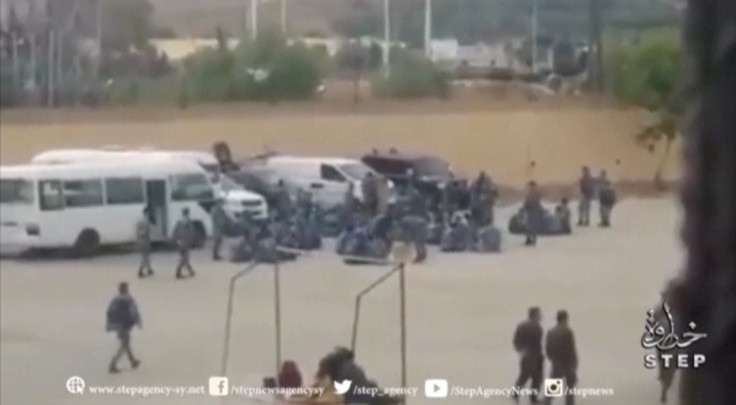Syria’s Unlawful Detention And Judiciary System At The Heard Of Hama Prison Unrest

BEIRUT— The Syrian regime is being accused of atrocities on yet another front — prisons, where most inmates are opposition political detainees. Activists are warning of a potential massacre in Hama province's central prison after Assad regime troops stormed it as detainees rioted, protesting their inhumane treatment.
Sheikh Nawwaf al-Melhem, leader of the opposition People's Party, told BBC News Monday that he was able to broker a deal between the two sides. President Bashar Assad’s government has not yet commented on the verbal agreement, but the root of the problem — prisoners deprived of basic human rights — remains.
“The situation in Syria’s detention facilities and prisons is deeply unstable, and prison conditions should be a priority for the international community,” said Nadim Houry, deputy Middle East director at Human Rights Watch. “Detainees, and their fate, should be at the heart of Syria’s negotiations. Their release should be on everyone’s priority list.”
Since the start of the civil war, the Syrian Network for Human Rights (SNHR) has documented the arrests of at least 117,000 people, who are being held in either official or unofficial government detention centers. From May 2015 through April 2016, at least 11,032 people were victims of arbitrary arrest, and roughly 70 percent of those detentions were at the hands of the Assad regime, according to data compiled by International Business Times. An arrest is deemed arbitrary when there is no evidence that a crime was committed.
Unrest inside Hama Central Prison began May 1, when inmates rose up against their guards and captured seven of them. The prison is housing up to 1,500 inmates, roughly 800 of them political prisoners. Many of them are being held without charge and in worsening conditions, including a recent outbreak of tuberculosis.
Regime forces stormed the prison Friday, using tear gas and rubber bullets against inmates. Water and electricity were also shut off in the cells, reported the Violations Documentation Center (VDC), a Syrian monitoring organization that documents detainees. At least 15 prisoners were wounded, according to the BBC.
Concern over Fate of Detainees in #Hama Prison as Regime Renews Attempts to Storm It https://t.co/0S8SIeX447#Syria pic.twitter.com/mDloSQXwf2
— Syrian Coalition (@SyrCoalition) May 7, 2016
“Inmates are running out of food and water, and even medicines are no longer being given to those in serious conditions,” Syrian rights activist Mazen Darwish, a former detainee, told Voice of America.
But the worst violations are the daily death sentences meted out, which violate international law and the Geneva Conventions. Aside from worsening living conditions, the tipping point for inmates came when security forces attempted to transfer five detainees, who had recently been sentenced to death, to the Sednaya Military Prison in Damascus.
Sednaya is infamous for its “abhorrent conditions, including overcrowding, lack of food, inadequate heating and ventilation, poor medical services, and extremely poor sanitary conditions that caused detainees to develop skin diseases and diarrhea,” reports Human Rights Watch.
The five inmates had been sentenced to death by the Field Military Court, “which has secret, closed-door proceedings that do not meet basic fair trial standards,” according to Human Rights Watch. These unlawful sentences are a near-daily occurrence in many of Syria’s detention centers.
The Field Military Courts are only supposed to be used during armed conflict with the “enemy.” By that definition, civilians should not be tried at these courts, which are not subject to any judicial appeal and where lawyers cannot speak to their clients or gain access to their files beforehand.
Conditions worsen for Hama prisoners as they revolt over executions. Gov't bloodbath feared. https://t.co/bWLzHF6ICR pic.twitter.com/lNORniC4PP
— Kenneth Roth (@KenRoth) May 8, 2016
But this isn’t the only unlawful fate awaiting Syria’s prisoners. Since the start of the civil war in 2011, a record number of prisoners have had their cases transferred to the Counter-Terrorism Court. In January 2014 alone, 800 cases from Damascus and 400 from Syria’s other provinces were transferred to the CTC, according to the VDC. In 2015, the CTC sentenced 20 inmates from Hama Central Prison to death “for engaging in peaceful protests after grossly unfair trials," according to Amnesty International.
One of Hama’s prisoners, a 26-year-old from Damascus countryside who asked to remain anonymous, was arrested at a government checkpoint in 2012. His case was transferred to the CTC shortly after. He has yet to see any evidence for his arrest, but he is sure his sentence, whenever it comes, will be brutal.
“Most of the detainees remained here for at least four years, and our stories are similar,” the detainee told SNHR. “Whoever possesses money to bribe the judge can get out of here, and those who do not must wait years before the courts to pass sentences of death penalty or life imprisonment.”
© Copyright IBTimes 2024. All rights reserved.






















